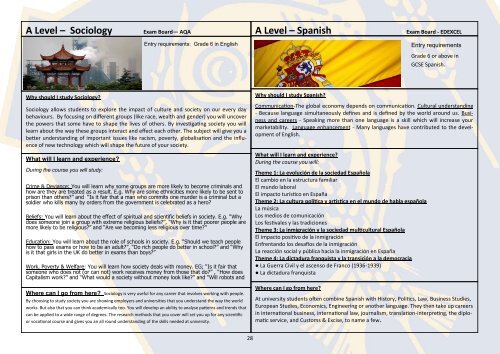Prospectus 2020-2022
The sixth form prospectus for students looking to join an Ofsted 'Outstanding' provision with a national reputation for academic success (top 17% for progress) sporting success (nationally recognised for rugby and cross-country) and cultural excellence through music and art.
The sixth form prospectus for students looking to join an Ofsted 'Outstanding' provision with a national reputation for academic success (top 17% for progress) sporting success (nationally recognised for rugby and cross-country) and cultural excellence through music and art.
Create successful ePaper yourself
Turn your PDF publications into a flip-book with our unique Google optimized e-Paper software.
A Level – Sociology<br />
Exam Board— AQA<br />
A Level – Spanish<br />
Exam Board - EDEXCEL<br />
Entry requirements: Grade 6 in English<br />
Entry requirements<br />
Grade 6 or above in<br />
GCSE Spanish.<br />
Why should I study Sociology?<br />
Sociology allows students to explore the impact of culture and society on our every day<br />
behaviours. By focusing on different groups (like race, wealth and gender) you will uncover<br />
the powers that some have to shape the lives of others. By investigating society you will<br />
learn about the way these groups interact and effect each other. The subject will give you a<br />
better understanding of important issues like racism, poverty, globalisation and the influence<br />
of new technology which will shape the future of your society.<br />
What will I learn and experience?<br />
During the course you will study:<br />
Crime & Deviance: You will learn why some groups are more likely to become criminals and<br />
how are they are treated as a result. E.g. Why are some ethnicities more likely to be sent to<br />
prison than others?” and “Is it fair that a man who commits one murder is a criminal but a<br />
soldier who kills many by orders from the government is celebrated as a hero?<br />
Beliefs: You will learn about the effect of spiritual and scientific beliefs in society. E.g. “Why<br />
does someone join a group with extreme religious beliefs?”, “Why is it that poorer people are<br />
more likely to be religious?” and “Are we becoming less religious over time?”<br />
Education: You will learn about the role of schools in society. E.g. “Should we teach people<br />
how to pass exams or how to be an adult?”, “Do rich people do better in school?” and “Why<br />
is it that girls in the UK do better in exams than boys?”<br />
Work, Poverty & Welfare: You will learn how society deals with money. EG; “Is it fair that<br />
someone who does not (or can not) work receives money from those that do?” , “How does<br />
Capitalism work?” and “What would a society without money look like?” and “Will robots and<br />
Where can I go from here? Sociology is very useful for any career that involves working with people.<br />
By choosing to study society you are showing employers and universities that you understand the way the world<br />
works. But also that you can think academically too. You will develop an ability to analyse patterns and trends that<br />
can be applied to a wide range of degrees. The research methods that you cover will set you up for any scientific<br />
or vocational course and gives you an all round understanding of the skills needed at university.<br />
Why should I study Spanish?<br />
Communication-The global economy depends on communication. Cultural understanding<br />
- Because language simultaneously defines and is defined by the world around us. Business<br />
and careers - Speaking more than one language is a skill which will increase your<br />
marketability. Language enhancement - Many languages have contributed to the development<br />
of English.<br />
What will I learn and experience?<br />
During the course you will:<br />
Theme 1: La evolución de la sociedad Española<br />
El cambio en la estructura familiar<br />
El mundo laboral<br />
El impacto turístico en España<br />
Theme 2: La cultura política y artística en el mundo de habla española<br />
La música<br />
Los medios de comunicación<br />
Los festivales y las tradiciones<br />
Theme 3: La inmigración y la sociedad multicultural Española<br />
El impacto positivo de la inmigración<br />
Enfrentando los desafíos de la inmigración<br />
La reacción social y pública hacia la inmigración en España<br />
Theme 4: La dictadura franquista y la transición a la democracia<br />
● La Guerra Civil y el ascenso de Franco (1936-1939)<br />
● La dictadura franquista<br />
Where can I go from here?<br />
At university students often combine Spanish with History, Politics, Law, Business Studies,<br />
European Studies, Economics, Engineering or another language. They then take up careers<br />
in international business, international law, journalism, translation-interpreting, the diplomatic<br />
service, and Customs & Excise, to name a few.<br />
28
















